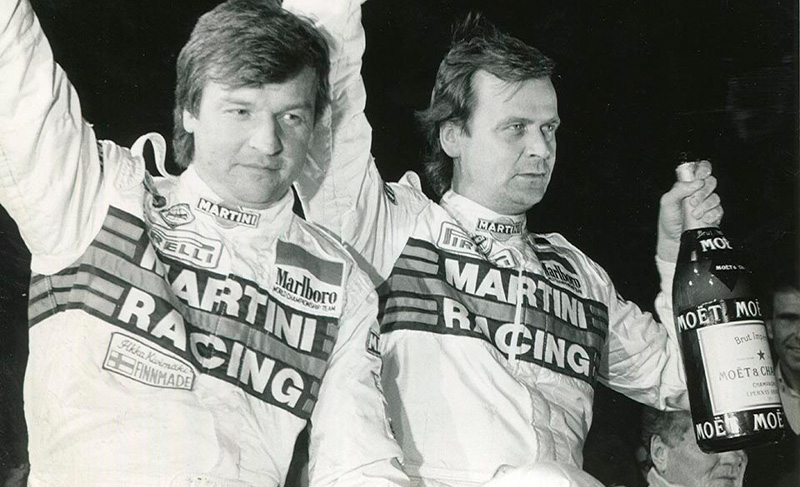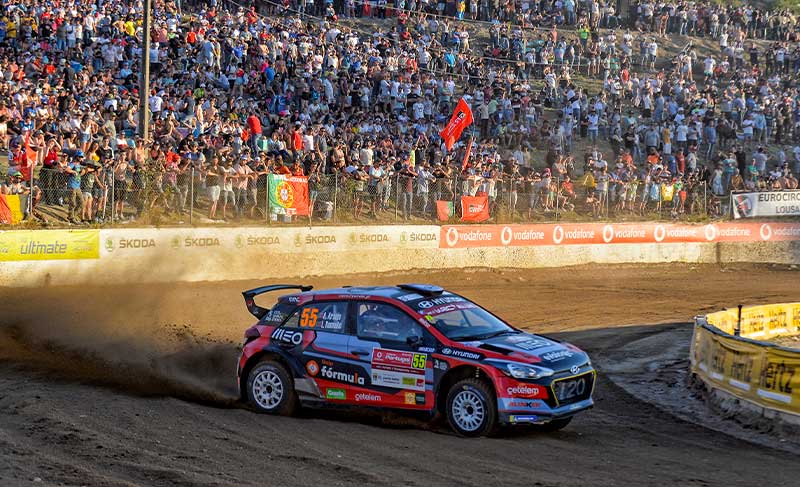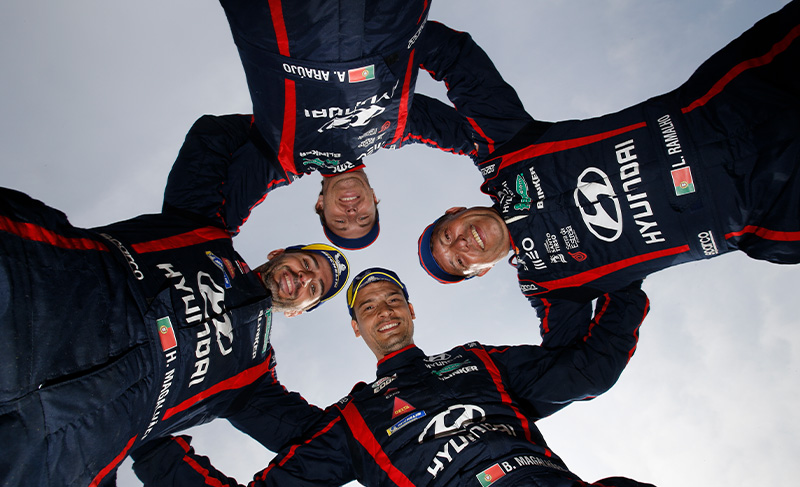An history made of more than 50 editions
The Vodafone Rally de Portugal, today the biggest motorsport event held in Portugal, took its first steps as a closed race aimed solely at employees of the Portuguese Airline (TAP). After six successful editions, TAP's president, engineer Vaz Guedes, decided that in 1967 the first international edition of the race that TAP's Cultural and Sports Group had organized since 1963 would take place.
Thus was born the I TAP International Rally, organized by Grupo Cultural e Desportivo da TAP, with Alfredo César Torres as the leading figure in leading a team that six years later placed the Portuguese rally in the first World Rally Championship.
Attracted by the toughness and competitiveness already in its third edition, the race registered a record of entries that lasts until today: 190 entries. In 1970, the TAP International Rally joined the first international championship, the European Rally Championship, and three years later it rose to the main level of world rallying. After the first two world editions of the race, the organizer and main sponsor changed. The Automóvel Club de Portugal became the organizer and the Instituto do Vinho do Porto, the main sponsor of the event, changing the designation to Rally of Portugal Vinho do Porto - this was the longest association of a main sponsor of the event, lasting 19 years.
But speaking of competition, the 70's were marked by the pre-eminence of one single figure: Markku Alén. The Finnish driver was a true antithesis, balancing youthful age with the wisdom and tactics of a veteran. He had his first World Rally Championship and Portugal Rally victory in 1975 - he repeated the feat in 1977, 1978, and then again in 1981 and 1987.

The success of the race was evident. At the end of the 1970s and beginning of the 1980s, the Rally received for five consecutive editions - from 1976 to 1980, and then in 1982 - the title of best World Rally. These were undoubtedly golden times for international competition, with several moments that forever marked the Rally: the Grand Prix of Sintra in 1978, on the last night, and which gave victory to Finnish driver Markku Alén; the mythical passage of Walter Röhrl in Arganil, in a depleting battle against the fog; Alén's impressive victory after tearing a wheel on the Peninha section; and the iconic victory of Michèle Mouton - the only woman to win the Rally of Portugal. By this time, the emotion around the races was at its peak, the passion was incandescent, and the will for more was immeasurable.
1984 was also an exemplary year, where the spotlight was on two drivers in particular: Hannu Mikkola and (again) Alén. With only 27 seconds difference between the two men, the winner was only known in the last special, contrary to what had happened in previous editions. The rivalry was almost palpable, but it was Mikkola who took first place behind the wheel of his Audi Quattro A2. The weather began to play a crucial role when it came to choosing the winner. Adverse and, above all, unpredictable weather conditions increased the rally's difficulty level, and 1985 was a perfect example: rain and wind destroyed most of the dirt tracks, to the point that navigator Seppo Harjanne stated that the tracks were as hard as those of Safari or Ivory Coast.
As early as 1986, during the golden age of Group B, the race had a top-notch entry list, increasing the public's interest. Unfortunately, such interest led to the number of spectators becoming uncountable. Such success brought thousands of people to the Sintra Mountains one morning in March of that year. The misfortune so often averted by chance ended up happening at Lagoa Azul, which amputated much of the rally's interest, given the abandonment of the main teams and protagonists of the race, and decisively marked the future of the World Rally Championship.
As time went by, the Rally became a fiefdom for Lancia, with several victories between 1987 and 1992. In 1994, TAP, which had been replaced by Port Wine as the main sponsor of the race in 1975, once again gave its name to the competition which, for the last time, started and arrived in Estoril. The following year, essentially due to new international regulations, the rally went through a structural change. So, for the first time after almost three decades, the race moved to Figueira da Foz, a city that was closer to the mythical Arganil, Fafe and Ponte de Lima specials. The weight of the novelty contrasted with the usual competitiveness, this time between Carlos Sainz and Finnish Juha Kankkunen. With only 12 seconds of difference, one of the smallest in history until then, the Spaniard finishes victorious, giving the first victory to the Subaru brand in the Portuguese race.
Whether by coincidence, or due to some metaphysical feat, the truth is that for six years, the classification was almost always decided until the last qualifying session. In 1996, Portuguese Rui Madeira took his first national victory in ten years. The driver from Almada entered in a true Luso-Belgian duel, with alternations in command, until Freddy Loix crashed in the early part of the race. From that moment on, it was just a matter of managing the race until Madeira secured the victory.
After three years in Figueira da Foz, in 1998, the race headquarters moved to Exponor, in Matosinhos, and took place, for the first time, without its mentor, Alfredo César Torres - who had died in London months before and had led the race since 1967. Despite the absence of his mentor, the quality of the Rally remained intact and registered one of the most memorable battles in the history of the race: Colin McRae vs Carlos Sainz. After the Scottish driver's initial domination, the Subaru Impreza WRC started to show engine problems, and this way, the Spanish driver got closer to the lead, which in the end was 2.1 seconds, the shortest difference ever between the winner and the runner-up. The 2001 edition of the Portuguese race was bittersweet. If on one hand the race was awarded the "Best Rally of the Year" prize given to the 2000 edition, on the other hand the incredibly adverse weather conditions made this year's edition the toughest, if not the toughest, in the history of the race. Unfortunately this, plus the desire to take the World Rally Championship to other places, contributed for the Portuguese race to be excluded by the International Automobile Federation from the 2002 championship.
The TMN Rally of Portugal, once the World Rally Championship was downgraded, had the desired welcome in Trás-os-Montes. During the following five years, the rally was out of the WRC competitions. And it was precisely during this time that Armindo Araújo stood out: with performances showing effectiveness and consistency, he won three times - in 2003, 2004 and 2006 - proving to be a new force in the Portuguese championship.

Araújo at the 2019 Vodafone Rally de Portugal

Araújo (on top) with Hugo and Bruno Magalhães, and Luís Ramalho
After three years in Trás-os-Montes, with the election of new social bodies for ACP, and fulfilling one of his reader promises, the new president of the club, Carlos Barbosa, and his team, set up a test rally in 2005 and 2006. With the recognition of the excellent work done, six years later, the race returned to the main rally championship of the world. And since then the Rally of Portugal has a fixed place in the WRC calendar.
From 2007 to 2014, the race was hosted in Algarve, with some passages through Baixo Alentejo. These were years of several highlights for the WRC: moments that forever marked the rally and that are still talked about among the fans: it was around this time that Sébastien Ogier started to take his first steps in the World Rally Championship, showing himself to be an unforgettable figure of the competition by winning the first of many victories in 2010 - repeating the feat later in 2011, 2013 and 2014.
Unforgettable was also the serious accident of Jari-Matti Latvala, who in 2009 "plunged" into a 150-meter abyss and came out of the accident unharmed thanks to the current safety conditions of the cars. In 2012, we saw the return of the stretches at night in the first stage and the big deluge that damaged the conditions of the floor on the second day, which made life for the drivers a real lottery.
After several successful editions in the south of the country, the Vodafone Rally de Portugal headed north again in 2015, offering the current WRC stars the opportunity to experience first-hand all the emotions and demands that made the ACP race mythical.
Since then the same premise has always prevailed: since 2015 all the winners have been different - many of them first-time winners. Ogier equaled Alén's victory number, when in 2017 he took the fifth victory of his career on Portuguese soil. That was the same year that the Rally marked its 50th anniversary, in what turned out to be a memorable edition of the race.
In 2020, the Vodafone Rally de Portugal was not held for the first time since its first edition in 1967. The cancellation came from the pandemic caused by COVID-19. The edition, scheduled for May 21-24, was postponed to the following year so that the appropriate and imposed prevention measures for this type of event could be put together. In 2021, still within the pandemic context, it was the first World Rally Championship event in which the public was allowed to watch a race complying with a strict contingency plan imposed by the health authorities.
A brief recap of the 2025 edition
By now, Sébastien Ogier is widely regarded as a legend of global motorsport. The French driver claimed his seventh victory at the Vodafone Rally de Portugal – the 63rd win of his World Rally Championship (WRC) career. This means that, over the span of a decade and a half, he has won nearly half of the editions he entered. This year’s triumph came by one of the narrowest margins in history: just 8.7 seconds.
Second place – separated by a mere handful of seconds – went to Ott Tänak. The Estonian led the rally from Stage 2 to Stage 16, until the power steering on his Hyundai gave way, costing him several valuable seconds. Third place was secured by the winner of the 2022 and 2023 editions, Kalle Rovanperä, Ogier’s Toyota teammate, who admitted he wasn’t surprised by the result.
With only four Portuguese drivers in the running, Armindo Araújo – driving for Skoda – was, unsurprisingly, the best among them for the 14th time, finishing in 26th place overall: “It was a very demanding four days, but we managed to maintain a safe pace throughout, which allowed us to complete the rally without any mechanical issues.”
In the Rally2 competition, Sweden’s Oliver Solberg claimed his first WRC2 victory in Portugal. Driving the Toyota GR Yaris Rally2, he led the event from the very start, finishing 51.8 seconds ahead of Yohan Rossel. Solberg set a blistering pace in the opening leg, building a lead that he was able to manage comfortably through to the finish – repeating his win from Sweden.